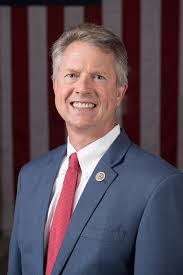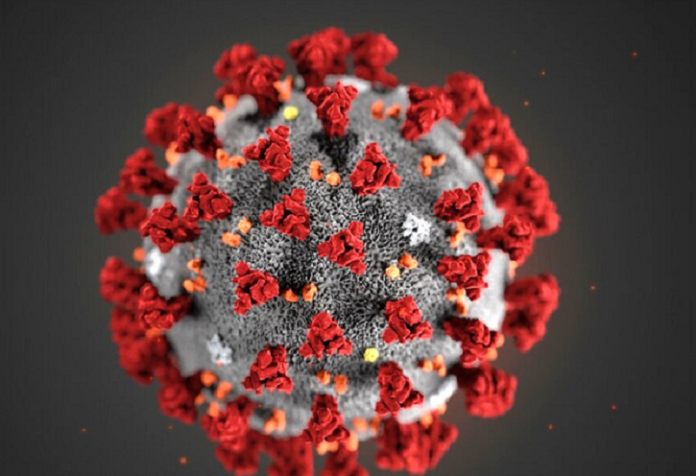Typically, Stacey Knoell’s relationship with technology was always on a “need-to-know basis.”
Now, the Democratic state Senate candidate is getting a crash course in technology as the spread of the coronavirus turns the political world upside down.

“In one week, I’ve had to sort of become a technological guru,” Knoell said. “I’ve learned how to use Zoom and Slack and Facebook Live.”
Knoell is like many candidates across the political spectrum who are adjusting to a new era of campaigning amid a pandemic threatening the health and lives of millions.
“It’s definitely been a difficult switch,” said Knoell, who is running against Republican state Sen. Julia Lynn.
“We’ve had to take the hard pivot toward digital,” she said.
“That’s been the thing — to try and figure out what’s the best way to use the digital platforms we have to continue to reach people.”
It’s a strategy that is playing out nationally as candidates at all levels are turning away from the meat-and-potatoes tactics employed during a campaign, whether it’s door-to-door canvassing, cocktail fundraisers or meet-and-greets.

“In terms of campaigning, the ground game has ground to a halt for all campaigns,” said Beth Vonnahme, a political scientist at the University of Missouri-Kansas City.
The Kansas Democratic Party, for example, has already shifted its campaign organizing efforts, including direct voter contact, from in-person work to virtual work.
The party has been urging candidates to follow suit. It also is encouraging voters to cast their ballots by mail for the May 2 presidential primary.
The state Republican Party, meanwhile, has postponed the second of four U.S. Senate debates scheduled for each of the state’s four congressional districts.
The debate had been set for April 9 at the Great Bend Farm, Ranch & Hemp Expo, which also was postponed because of the coronavirus.
Republican Party Chairman Mike Kuckelman said he would like to hold live debates but held out the possibility they could move online if conditions don’t improve.
Meanwhile, Kuckelman said the party is counseling candidates individually.
He said the party is recommending against campaigning door to door in areas of the state without stay-at-home orders and holding meetings with more than 10 people.
“So many candidates are scrambling to put together ways to keep their campaigns going virtually,” Kuckelman said.

“Every candidate is going to have to make a decision for themselves: What do you do if you can’t go door to door?” he said. “The alternative is not going to be as good, but it’s an issue every campaign is facing equally.”
The national Republican Party, meanwhile, is recommending that House members withdraw field teams and make phone calls instead.
It also urged its members to call donors in place of holding fundraisers.
“The coronavirus is presenting a unique challenge for congressional campaigns nationwide,” National Republican Congressional Committee Chairman Tom Emmer wrote in a memo.
“As President Trump and our leading health experts are fighting to defeat this virus, every campaign must exercise increased sensitivity on what is politically appropriate.”
Door-to-door campaigning — long considered the life’s blood of a local campaign — is basically out of the question for now, with no certainty of when candidates can safely return to the doorstep.
Meeting potential supporters in large groups also is a nonstarter, with stay-at-home orders and limits on mass gatherings now in place to prevent the spread of the virus.
And fundraising lingers as a potential hurdle as the economy struggles with hundreds of thousands losing their jobs as the public health threat shuts down businesses nationally.
“Obviously, the whole rule book is out the window,” said Democratic state Rep. Brandon Woodard, who has canceled bimonthly public meetings he has with constituents.
And it doesn’t bode well for challengers, experts said.
“They are going to struggle without the ability to interact with the public and without the free media coverage that comes along with that interaction,” Vonnahme said.
“Digital strategies are expensive and continue to be less effective than canvassing,” she said. “A human touch remains the most effective way to persuade voters.”

Republican state House candidate Clay Norkey is running into some headwinds as he mounts a primary campaign against Republican state Rep. Chris Croft in Johnson County.
“Door-to-door canvassing is probably one of the bedrock ways to campaign around here, and that’s been taken off the table,” Norkey said. “It’s almost impossible to be face to face with anyone at this time.”
He said his campaign is still moving forward, but it may have to increase direct mail, emphasize social media more and hold virtual listening sessions with voters online.
“You get a mindset of what you know it’s going to take and have a plan in place, and then something like this kind of turns it over upside down,” Norkey said of the pandemic.
“But that’s all part of adjusting, reorganizing and coming up with a new plan,” he said.
And fundraising has been challenging, too, he said.
“A lot of folks are concerned about the economy,” he said.
“A lot of small-business owners are wondering if they’re going to be able to reopen,” he said. “A lot of folks are wondering if they will be going back to work and when.”
Norkey said a number of donors have sent small contributions, promising to give more when business returns to normal.
It’s a problem that will hit every candidate as donors either hold onto their disposable income or redirect it elsewhere, Vonnahme said.
“Contributors may choose not to spend funds on campaigns given the vast needs being placed on the philanthropy community, the cost to investors, and the negative effects on business income,” she said.
Heather Scanlon, chief of staff for House Minority Leader Tom Sawyer, said House Democrats are not making direct requests for campaign contributions at this time.
“We don’t feel it is the right time to do that,” Scanlon said.
“People are being laid off, they’re losing their jobs, they’re stuck in their homes,” she said. “It’s not a time to ask for political contributions.”
Democratic state Rep. Brett Parker said this time might be most ideal for what he termed “relational organizing” rather than cold-calling voters.
“Candidates who are able to tap into already existing community networks of friends, family and neighborhoods to get the word out will probably do well,” Parker said.
Experts and strategists said that candidates with high-name recognition who have already raised a lot of money would have an advantage in this new world of campaigning. It also could favor incumbents, who tend to have both.
If door-to-door campaigning is restricted as the virus spreads in the months before the election, it could hurt upstart candidates, said Washburn University political scientist Bob Beatty.
“Door to door can be very important for down-ballot races,” Beatty said. “That’s where we sometimes see a candidate surprise people because that candidate spent four months, eight hours a day knocking on doors.”

State Sen. Lynn, who’s facing a challenge from Knoell, said she thinks she’s in a good position as a three-term incumbent with $65,000 on hand at the end of last year.
“It’s hard to campaign when you’re in a state of unknown about what you can and can’t do and how you innovate through that” Lynn said.
“Everyone’s limited,” she said. “It’s going to be the survival of the fittest.”
Even before the stay-at-home orders were imposed earlier this week, candidates running for the U.S. Senate and Congress had already started canceling in-person events in favor of telephone town halls and phone calls.
Republican Congressional candidate Amanda Adkins had put a hold on all public events in the 3rd District race for the foreseeable future before the stay-at-home orders were issued, said Maggie Collins, an adviser to Adkins’ campaign.
“Clearly, no matter what happens, no matter how long it lasts, it’s the same for everyone in the race,” Collins said. “We’re all operating under the same conditions.”
She said the Adkins campaign is trying to find ways to recreate some of the events that had been postponed in a different format.
“We are looking at additional ways to engage with voters in a meaningful way,” Collins said.
Republican 3rd District Congressional candidate Adrienne Foster started canceling in-person events in mid-March and won’t hold any more until after the stay-at-home orders are lifted.

Foster has a Facebook Live event planned in the next couple of days, and the campaign is expected to start holding two a week until the stay-at-home orders lapse.
Spokeswoman Samantha Poetter said the Foster campaign had already replaced door-to-door canvassing with phone banking from home.
The campaign, she said, had been knocking on 500 doors each weekend. Those will now be converted to calls.
“We’re still reaching out to voters and people in the district, we’re just having to do it with a safer strategy,” Poetter said.
Republican 3rd District candidate Sara Hart Weir started scaling back in-person organized campaign events earlier this month in favor of more indirect voter contact, such as phone calls, texting, emails and digital messaging.
Over in the U.S. Senate race, Democrat Barbara Bollier has canceled all in-person events until mid-April at the earliest.
She held a Facebook Live event last Friday and had a telephone town hall event this Friday morning.
The Bollier campaign had already been limiting public appearances and encouraging staffers to work from home.
Democratic U.S. Senate candidate Usha Reddi posted on Twitter last week that she was halting her campaign temporarily.
“I am pausing my campaign temporarily as we all face the urgency of overcoming the COVID-19 crisis,” Reddi wrote in her post.
“I’ve asked my team members to focus on keeping themselves and their families healthy while we all navigate the unknown road ahead,” Reddi wrote.
“These past few weeks, I have been completely immersed in making critical decisions needed to lead my city’s response this crisis,” she posted.
“Without drastic measures, COVID-19 will have a devastating impact and as mayor of the City of Manhattan, my first obligation is to keep my city safe.”
Congressman Roger Marshall’s Senate campaign also has adjusted, replacing in-person gatherings with virtual meetings and phone calls.
“He’s working just as hard, we’re finding new ways to do it,” Marshall campaign manager Eric Pahls said.

Pahls said the pandemic presents a complex problem for strategists, especially if efforts to contain the virus continue into May and June with a primary set for Aug. 4.
“If campaigns are adjusting by saying, ‘Well, we’ll just spend and post on social media and spend on TV,’ you’ve got another thing coming,” he said. “That is not going to be the solution.
“It’s going to involve some creativity. It’s going to involve some really intense planning,” Pahls said. “We are working on that right now, and we’re feeling pretty good about it.”
Pahls said Marshall had already been laying groundwork for many months before the public health crisis hit.
He had about $2 million in the bank at the end of last year, and he’s visited every county in the state, some multiple times.
Republican U.S. Senate candidates Kris Kobach is moving to telephone town halls and Facebook Live events.
His “Constitution 101” events that he’s been holding around the state were recently moved to Facebook.
“All kinds of things that would normally be at the very heart of a political campaign are no longer happening,” Kobach said.

“These virtual town halls and virtual events are good,” he said, “but they’re still not as good as actually getting out and talking to people face to face.”
It is anticipated that the disruption in the political system — if for a prolonged period — will drive candidates increasingly to digital platforms, whether it’s Facebook, YouTube, Instagram or any other platform that might be available.
But are digital campaigns the answer for American politics?
The former chairman of the Federal Communications Commission suggested not.
Tom Wheeler, FCC chairman from 2013 to 2017, suggested that a political scene dominated by digital advertising will divide an already polarized electorate.
If the coronavirus worsens and threatens political campaigning as we know it, Wheeler agues the FCC should require broadcasters to provide free airtime to candidates.
“Should coronavirus alter the nature of political campaigns, the ability of television broadcasters to deliver a common message on a broad scale will become more important,” he wrote in a column published by the Brookings Institution.
“If we have to suspend or otherwise modify political campaigning because of coronavirus, social media will become even more important and the fissures it creates even more painful,” Wheeler wrote.
Social media platforms, he argued, divide the country because they target messages tailored to specific voters and reinforce “our tribal traits.”
“Dividing us by delivering messages based on the information gathered about each of us undermines the coming together that democracy requires.”













